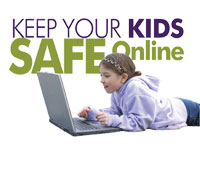11 Jun 2014 - {{hitsCtrl.values.hits}}
 The Internet has brought the world into our homes and is a veritable treasure trove of information for all the family to explore. From homework help to online collaboration, messaging and researching, our children can gain a lot from the web. Using Internet communication tools such as mobile phones, social networking, online gaming, chat rooms, email, and instant messaging can put children at potential risk of encountering online predators. Children present additional challenges because of their natural characteristics such as innocence, curiosity, desire for independence, and fear of punishment.
The Internet has brought the world into our homes and is a veritable treasure trove of information for all the family to explore. From homework help to online collaboration, messaging and researching, our children can gain a lot from the web. Using Internet communication tools such as mobile phones, social networking, online gaming, chat rooms, email, and instant messaging can put children at potential risk of encountering online predators. Children present additional challenges because of their natural characteristics such as innocence, curiosity, desire for independence, and fear of punishment.
23 Dec 2024 23 Dec 2024
23 Dec 2024 23 Dec 2024
23 Dec 2024 23 Dec 2024
23 Dec 2024 23 Dec 2024